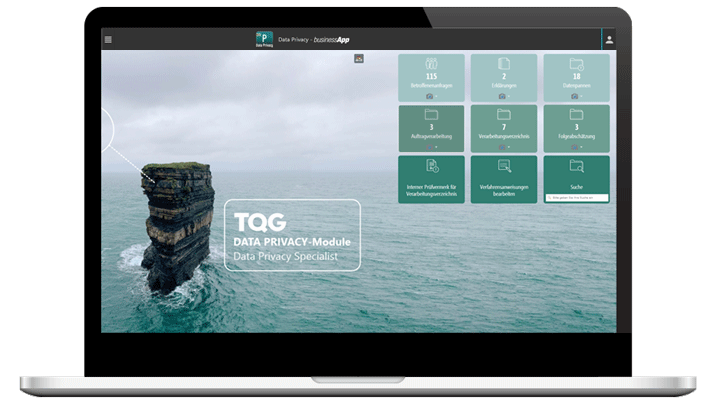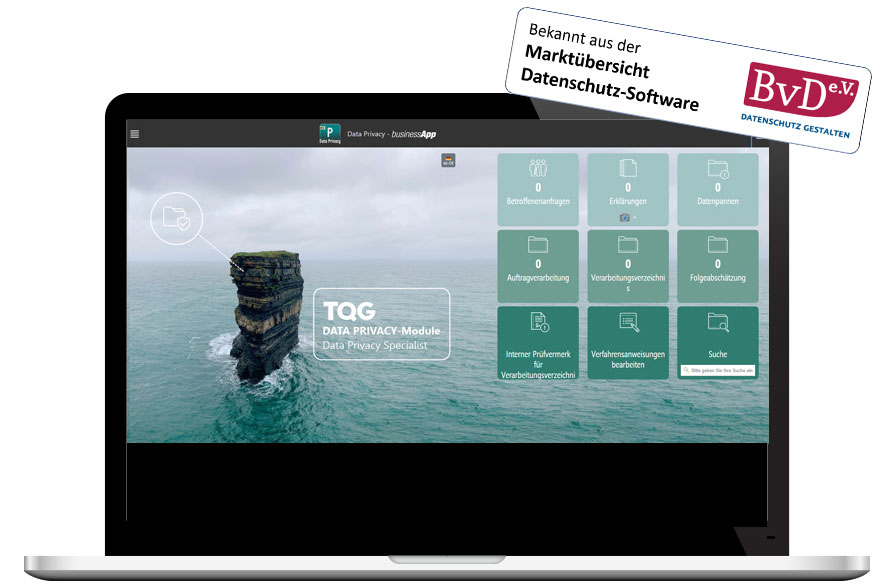Data Privacy Software
Efficient data protection management for your company
With the TQG businessApp cloud platform you can manage your data protection company-wide:
- Exchange with the specialist departments
- Audit-proof documentation
- Conformity with regard to retention periods
- Automation and standardization of routine processes


Data protection management software -
these are your advantages!
We offer you a user-friendly complete package of data protection management software. Control data protection centrally and obtain consistent and audit-proof documentation. The businessApp assists and links documents that belong together.
With the TQG businessApp cloud platform you have your company's data protection management centrally in one place - everything at a glance in one businessApp!haben Sie das Datenschutzmanagement Ihres Unternehmens zentral an einem Ort - alles auf einen Blick in einer businessApp!
Efficient data protection management: the complete solution for your structureCentralized access to templates and thus all data protection-relevant processes always in view
Workflow-controlled information (such as FAQs) is provided by the data protection department
Precise instructions save time & money and all important information is digital & clear
Overview of the features
Processing activity
Record all data protection information clearly and keep the register of processing activities structured and centralized in one place.
More
A core element of data protection is the record of processing activities. We offer a standard workflow for this to make your data protection processes even more efficient: The data protection employee starts the workflow to contact the responsible persons in the specialist departments and ask them to specify processing activities relevant to data protection.
The information follows a pattern, which the data protection employee checks and assigns to the complete directory at the touch of a button.
The simple step-by-step instructions create a uniform basis for all processing activities relating to personal data. By linking the processing activities to files, documents or contracts as required, you can easily track your compliance and are always able to provide information to data subjects and supervisory authorities.
Technical and organizational measures (TOM)
TOMs are a multifaceted concept and include both technical and organizational protective measures.
More
Technical and organizational measures are an essential component of data protection that serve to protect personal data from unauthorized access, loss or misuse.
The businessApp platform helps you to implement them easily and efficiently. With the businessApp platform, the TOMs to be taken can be documented comprehensively. The TOMs can be created and managed quickly and conveniently via an input screen. It is also possible to link the TOM to other areas of data protection management, for example to the processing directory or data subject request features.
Data subject requests
Processing data subject requests quickly and efficiently in accordance with data protection regulations is no problem with customized workflows.
More
Article 15 of the General Data Protection Regulation grants data subjects a right to information. This means that as soon as they submit a data subject request to a company, the company must provide a detailed overview of which data of the person making the request has been processed.
In the BusinessApp platform, a workflow guides you through the data subject request. This is based on a form that you make available to your customers, employees or other stakeholders on your website. The data is already pre-structured using the template.
The BusinessApp platform can then automatically document and assign the requests. The data protection employee receives a structured overview of all requests and receives timely reminder e-mails informing them of the processing deadlines for individual requests.
Data protection impact assessment (DPIA)
The more risky and damaging data processing can be for data subjects, the higher the requirements of the GDPR.
More
With the businessApp platform, you can carry out a GDPR-compliant data protection impact assessment in a simple and structured manner. Technical and organizational measures are an essential component of data protection that serve to protect personal data from unauthorized access, loss or misuse.
With the businessApp platform, the TOMs to be taken can be documented comprehensively. The TOMs can be created and managed quickly and conveniently via an input screen. It is also possible to link the TOM to other areas of data protection management, for example to the processing directory or data subject request features.

Successfully building a data protection organization through the use of legal tech
Make compliance with data protection the figurehead of your company! We will show you how a data protection organisation can be successfully established through clearly defined workflows and the use of legal tech.
Benefit from businessApp data protection in the TQG businessApp cloud platform
Meeting data protection requirements is an investment for you and your company.
Realize YOUR data protection management with the TQG businessApp cloud platform:
WORKFLOWS & AUTOMATION
For tracking processes
DEADLINE WORKFLOW
firmly integrated in the TQG businessApp cloud platform
COMPANY-WIDE DMS SYSTEM
usable in every department, globally available
PROCEDURE DOCUMENTATION
all procedures at a glance, documented
and archived
LAWFUL ACTION
Ensuring lawful action in the sense of good corporate governance
AUDIT SECURITY
Audit security through history management.
All files and processes remain in view.
POSITIVE PUBLICITY
through efficient data protection management
RESUBMISSIONS & TEMPLATES
Resubmissions and Template Management
DATA PROTECTION MANAGEMENT PROCESS
Documentation based on a firmly established process
EXCEL & BIRT
Excel and BIRT Reportings are possible
SMART-SEARCH
Research with smart-Search
CROSS-DEPARTMENTAL COLLABORATION
Improving collaboration across the enterprise
DOCUMENTATION
Order processing contracts, data protection tasks,
processing activities, processing directory
MANAGEMENT OF REQUESTS
Management of requests from concerned persons
TRANSPARENCY
Increase transparency
Video: 600 seconds on data protection and legal tech (only available in German language)
600 seconds about... Data protection and legal tech
In less than 10 minutes, you'll learn everything you need to know to successfully build a data protection organization through legal tech!
! There are no excuses - now we're tackling digitization
❓ What do I need to consider?
❓ What are the risks and dangers if I don't do it?
❓ How do I fill a data protection organization with life?
Violetta Weber (Senior Data Privacy Expert) provided the answers to these questions at the Digital Opening of the 2021 Corporate Counsel Conference.
Checklist for data protection
- Involve the data protection officer more closely, define responsibilities
- Establish data protection impact assessment/privacy impact assessment as a process
- Design processes: Reporting obligations in the event of data breaches
- Design other processes: Data subject rights, information obligations, etc.
- Document all processes
- Adapt commissioned data processing (ADV) contracts
- Review directory of procedures
- For processors: create new directory of processing activities
- Set up training schedule
- Document (have documented) and evaluate technical and organizational measures (TOM), define responsibilities
- Check effectiveness of TOM, plan penetration tests and information security management
- If necessary, plan technical implementation of data subject rights - information, data portability, etc.
- Check forms and consents
- Adapt privacy policy, adapt web tracking if necessary
E-learning - raise awareness through employee training

Employee training and raising their awareness is simply part of common sense data protection. With the TQG businessApp cloud platform (e-learning module), training can be carried out easily and in a structured manner.
Employees who process personal data must be instructed on data protection and information security at regular intervals. Only well-trained employees can recognize potential risks in good time and thus avoid errors and data breaches.
Provide your employees with an online learning platform via the TQG businessApp cloud platform, which is used for the regular training of managers and employees. The TQG businessApp cloud platform supports the audit-proof documentation of training measures. The platform allows you to avoid duplication of work and efficiently implement data protection compliance.
Aufbewahrungsfristen Datenschutzkonform managen
Mit der TQG businessApp cloud platform den Datenschutzanforderungen vollumfänglich gerecht werden

Artificial intelligence (AI) for document management
- AI-supported contract creation, contract design and documentation
- AI-supported analysis and evaluation of contract content
FAQs
From personalized advertising to smart homes - data plays a major role in every area of life. It is valuable and must be protected. In Europe, the General Data Protection Regulation (GDPR) defines the scope and measures to be taken to ensure the secure handling of personal data.
What are the challenges of data protection management?
Data protection is a very important area of law, and company management must ensure compliance with it. Data protection is abstract and difficult to grasp. Personal data can be passed on and still be used at the same time. The right to informational self-determination must also be taken into account.
In order to safeguard this right, certain basic principles must be taken into account. This also applies when artificial intelligence (AI) is used. This is because AI must also be regularly fed with data sets in order to learn; this may also include personal data.
What does the GDPR mean for companies?
As mentioned at the beginning, the GDPR regulates the processing of this data. Companies must be able to demonstrate compliance with the principles arising from the GDPR. In return, the regulation rewards risk-minimizing measures taken by companies at various points.
We can help you set up a data protection management system or a data protection organization!
